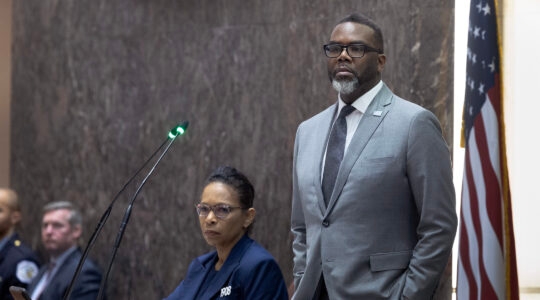WASHINGTON (JTA) — CNN fired a senior correspondent who praised a Muslim cleric associated with Hezbollah.
Meanwhile, a British Foreign Office spokesman said that Britain’s ambassador to Beirut was not reflecting the British government’s view of Sayyed Mohammed Hussein Fadlallah when she praised the cleric.
Octavia Nasr, CNN’s senior Middle East editor, was forced to leave her position Wednesday after calling Fadlallah a "giant" in a Twitter post following his death last weekend.
CNN and Nasr called the tweet an "error in judgment" on Tuesday, but that did not end the matter. An internal CNN memo leaked to the media Wednesday said Nasr’s "credibility in her position as senior editor for Middle Eastern affairs has been compromised going forward.”
Jewish groups had protested the tweet, noting Fadlallah’s role in founding the terrorist group, in praising deadly terrorist attacks on Israeli civilians and in denying the Holocaust. However, at least one group, the Anti-Defamation League, said it was satisfied with the statements of regret Tuesday from Nasr and CNN, and did not call for her firing.
Nasr explained in a blog post Tuesday that she did not respect Fadlallah’s record, noting that as a Lebanese Christian, she had lost relatives to Hezbollah attacks while he was a leader of the organization in the 1980s.
She added that he had pressed for women’s rights and had slammed Hezbollah’s closeness to Iran in recent years, a position that led the movement to marginalize the cleric.
"I used the words ‘respect’ and ‘sad’ because to me, as a Middle Eastern woman, Fadlallah took a contrarian and pioneering stand among Shia clerics on woman’s rights," Nasr wrote. "He called for the abolition of the tribal system of ‘honor killing.’ He called the practice primitive and non-productive. He warned Muslim men that abuse of women was against Islam."
The ambassador, Frances Guy, in her blog wrote about the “passing of a decent man,” praising Fadlallah. However the Foreign Office pointed also to his support of attacks on Israel.
In the blog, which is part of the British Foreign and Commonwealth Office’s website, Guy wrote Wednesday that after meeting Fadlallah, “you would leave his presence feeling a better person.” Guy went on to write that “The world needs more men like him willing to reach out across faiths, acknowledging the reality of the modern world and daring to confront old constraints.”
However, the Foreign Office spokesman issued a statement saying that Guy "expressed a personal view on Sheik Sayyed Fadlallah, describing the man as she knew him. We welcomed his progressive views on women’s rights and interfaith dialogue. But also had profound disagreements — especially over his statements advocating attacks on Israel."
JTA has documented Jewish history in real-time for over a century. Keep our journalism strong by joining us in supporting independent, award-winning reporting.





